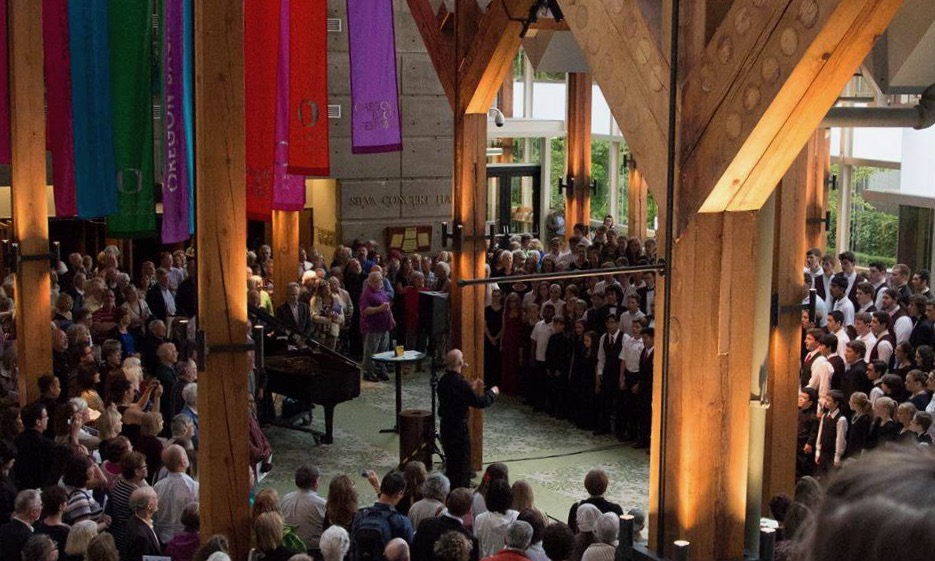Oregon fudges its Bach Festival again
NewsWhat was once the best Bach festival in America remains – after multiple sackings and backtrackings – a global laughing stock.
The latest?
The OBF has named Jos van Veldhoven of the Netherlands Bach Society and Conspirare artistic director Craig Hella Johnson as its new ‘artistic partners.’
So far, so dubious. An artistic partner is all title and no authoity.
But wait: The pair will join OBF’s other artistic leaders: choral directors Kathy Saltzman Romey with the Oregon Bach Festival Chorus, Anton Armstrong with the Oregon Bach Festival Stangeland Family Youth Choral Academy, and Sharon Paul with the University of Oregon Chamber Choir, as well as Grammy-winning organist Paul Jacobs of the Oregon Bach Festival Organ Institute.
Chaos, pure and simple.






It’s perhaps rather more structured than may be portrayed here. Having more than one artistic partner is working quite well in a number of musical organisations. Jos van Veldhoven really does know his Bach, having been director of the Netherlands Bach Society (NBV) from 1983-2018: the NBV’s “All of Bach” project is an amazing resource whose genesis owes much to van Veldhoven. Craig Hella Johnson also has a strong choral background. The other three named choral people are directors of the various local choruses from whose ranks the OBF draws its singers, and Paul Jacobs is the go-to organ man of the region.
These two main artistic planners, Jos van Veldhoven (age 71), Craig Hella Johnson (61), both have no need to use the OBF to further their careers elsewhere, so there will surely be more stability than that which ensued after the previous appointment of an ambitious but reportedly not so diplomatically astute artistic director. With these two well-grounded musicians at the helm, OBF should now benefit from sound, unspectacular, stable artistic leadership, maybe returning predominantly to performing music by the composer after whom the festival is named. Perhaps not such a bad move if the festival aims to rebuild and re-establish itself.
Aiming for a new job? The OBF Ministry of Propaganda couldn’t have said it better.
Unfair, Doug.
Certainly not! Here’s my (free) consultancy opening set of questions, asked quite genuinely of you.
Were you in a position at OBF to pull all the levers, who would you appoint, and in what positions: artistic, administrative, board, and fund-raising? With what structure behind them? And how would all that be funded? (And would you want a position within this? If so, in what capacity? And, also if so, what is your experience and your qualifications?). And how would you recommend bringing together and harmonising what still appears to be quite entrenched and not wholly united factions around the OBF?
To an outsider, isn’t the current plan – appoint two experienced, musically safe and diplomatically astute musicians who’ve managed to keep their organisations afloat across many years, who will work positively with three regional choral directors – a positive step to rebuild what was once a well-regarded festival?
Recently, I asked musicians how many OBF audience members out of ten could explain a fugue.? The answers ranged from 0 to 1. But how many OBF audience members could give a describe a fugue 30 years ago ? Answers ranged from 1 to 5. I think 5, or half, thirty years ago is right.
OBF’s original success rested on an audience steeped in choral music, including church choirs. These were folks who could still sing the alto part to a Bach Chorale. They were, in terms of classical music and traditional pop songs, musically literate.
Audiences today are basically musically illiterate . They have been raised on music with very little harmonic substance. Traditionally, a C# in the key of d minor has a distinct character. Today, that C# is just another tone in a blur of sound. Someone who doesn’t hear music in a tonal framework will have a tough time with Bach.
I’m sorry to say that I don’t think simply programming Bach will bring them back, though more Bach is important. I think today we must call on brilliant musicians with irresistible personalties to restore audience support.
OBF decision making in the past was solely in the hands of Rilling and Saltzman. The Matthew Halls era is more difficult to decode, but his musicianship and personal appeal was extraordinary. We can’t keep complaining about his dismissal, but we have to learn any lessons from his success.
Now we are told that OBF artistic decisions will be shared among a number of conductors. But another person hasn’t been mentioned. The actual head of OBF is the Dean of the Music School who has the final say. The festival is now fully in an academic structure. How do you think this will work out?
Just out of curiosity, how did the orchestra members find out what the audience knew about fugues? Did they set a test, or conduct a survey? And was the same thing done 30 years ago? This sounds like anecdotal guess-work to me, but I could be wrong.
I should have been clearer. It didn’t actually happen. It was a hypothetical to question how colleagues assessed the musical literacy of audiences.
Well after the fact, but just have to point out some inaccuracies with this statement. First, Romey, Armstrong, and Paul are not, in fact, “directors of the various local choruses from whose ranks the OBF draws its singers.” Paul is a faculty member at the University of Oregon; Romey and Armstrong are both on faculty at midwestern schools. While the University of Oregon Chamber Choir is made up students from the university, the Youth Choral Academy and (especially) the OBF Chorus draw their members from all over the country. Not at all a “local choruses” sort of thing.
Finally, to push back on your choice of phrase, Craig Hella Johnson, who has won or been nominated for 10 Grammy awards, is a fair bit more than just someone with a “strong choral background.” He’s easily in the top handful of choral conductors in the U.S. over the last several decades.
Sad. Oregon is traditionally where classical music goes to die.
Taking a moment to thank you for the interesting article. Your writing style is refreshing, and I enjoyed every bit of it. Thanks!
Many of my most cherished musical moments were at OBF, before the firing of M Halls. After that it has been such a hit and miss, sparingly attended, and not looked forward to event for me. The excitement and charisma built by the founders, and elevated during Hall’s short tenure, is gone and probably can’t be resurrected.
A surprising misread of the situation, Lebrecht. This is a decision that honors both the historically-oriented and forward-looking elements of the OBF, and a decision that honors both founders – Helmuth Rilling can certainly respect it and I guarantee that Royce Saltzman would as well. Your interpretation of the list of additional artistic personnel as being chaotic ignores the fact that OBF has developed a more collaborative structure in the absence of singular artistic leadership in addition to responding to the evolving realities of existing under the umbrella of the University of Oregon.